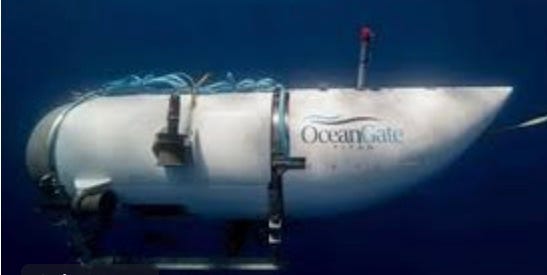Expensive Adventure Gone Awry
The news of the implosion of Titan, the OceanGate submersible, was tragic. The five occupants are presumed dead. This piece of expensive ($250,000 per passenger) adventure tourism has dominated the news since the mission began last Sunday.
The catastrophic end is drawing a great deal of critical commentary. Most reports indicate that the risk was high, the design of Titan was experimental (carbon fiber), and that the hull likely imploded very early in the mission.
Some folks question the very act of seeking to explore the remains of the Titanic, considering it a violation of a sacred place. Others see the patrons of adventure tourism as pampered and self-indulgent. $250,000 is indeed a mighty expensive one-day vacation.
And, as frequently the case in rescue attempts of this kind, there is concern about the vast resources expended in what was unfortunately an unsuccessful attempt. New Hampshire, as one example, reserves the right to make failed adventurers pay the costs of saving them from their misfortunes and/or misjudgments. Many times significant resources are expended saving ill-prepared dilettantes who wander into trouble and can’t find their way out. But in the broader scheme of things, these costs are a mere pittance. Even these occasional bumblers deserve respect. At least they got off the couch and gave living a try.
The scope of this incident, especially the search effort, is massive, but the dynamics are familiar.
Whether seeking to summit Everest, sink to the ocean’s greatest depths, fly in a body suit or “free solo” (climbing with no safety gear) a massive cliff, some humans are drawn to extreme adventure. Even in the somewhat more modest environs of the Rockies or White Mountains of New England, climbers find high risk in hostile conditions.
Similar debates are frequent in backcountry Colorado and other places where skiers and snowboarders try things most of us would not consider. They too are living at the edge and occasionally need rescuing. Some don’t make it, like the brother of a local friend, who was buried in an avalanche a few years back.
On a much more modest scale, in July, 2020 I had the misfortune/misjudgment of crashing on a mountain bike jump and needed helicopter transport, emergency surgery and extensive, incomplete, rehabilitation.
The victims of the Titan disaster and their loved ones should be granted time and space to process this tragic experience. And we should all be mindful of perspective. During this same timeframe more than 300 immigrants died at sea. Much greater tragedies than Titan regularly pass virtually unnoticed. In that sense, it seems almost obscene to dedicate our international attention to the fate of five wealthy men who died as a result of their own choices. But they are not to blame for the disproportion. The sensational coverage should not dictate how we view the failed mission.
I write to offer what may be an unpopular view. I have respect, not disdain, for these adventurers and for others who choose to stretch the limits of possibility, often with acute awareness of the risks. I don’t know the presumed scientific benefits this particular mission claimed, but I believe there is value in every attempt to do what has not been done; to go where no one has gone, to build what has not been built. One fellow ocean explorer, defending the Titan mission despite the catastrophe, pointed out that the Wright brothers could have been deemed fools as easily as heroes had their flight ended in catastrophe. That is a bit overstated, as the parallel is forced, but the point is well taken. Human advances often come with failed attempts, including the loss of life.
But aside from the purpose of high-risk adventures, the spirit is a powerful, often magnificent, expression of our humanity. Even wealthy adventure tourists who draw criticism for scaling peaks like Everest with luxurious support, are responding to the same spark that has driven the most renowned explorers, from Ernest Shackleton to Edmund Hillary to Neil Armstrong.
I prefer non-commercial adventures and understand all the criticism, but can only express respect for anyone who dedicates their life to exploring Earth’s greatest depths and heights - including the wealthy men who paid $250,000 to do something few would dare.



